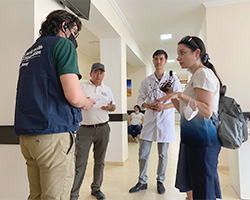WHO conducts comprehensive health system assessment in Uzbekistan’s Karakalpakstan region

WHO
WHO/Europe, in partnership with the Government of Uzbekistan, has just concluded the first part of a comprehensive health system assessment in the country’s Karakalpakstan region. The assessment will help to illuminate the health needs of people living in the region, in the context of dramatic environmental and socioeconomic change.
The desiccation of the Aral Sea, today only 10% of its original size, is one of the greatest environmental disasters of recent years. The loss of water has resulted in land degradation and desertification of vast areas of Karakalpakstan. This has led to severe malnutrition, a shortage of drinking water and the overall deterioration of health conditions among the local population.
The assessment is WHO’s first project under the United Nations Multi-Partner Human Security Trust Fund (MPHSTF), a joint endeavour funded by the governments of Finland, Norway, the Republic of Korea and Uzbekistan, and the European Union.
“Following a proposal by the Uzbek government, WHO is working to increase access to adequate hospital care for people living in the Aral Sea region, while also looking for opportunities to strengthen primary care, including through the use of digital health technologies,” explained Dr Lianne Kuppens, WHO Representative and Head of the WHO Country Office in Uzbekistan. “Our emphasis is on the empowerment of local communities, and especially women.”
Understanding local expectations
During the assessment visit, from 31 May to 5 June, the group of experts from WHO/Europe were joined by community leaders, as well as United Nations and government partners, to help gain a better understanding of local expectations.
The WHO experts met and engaged with key stakeholders to identify the major needs of the health sector and refine proposals for better investment and alignment with national reforms currently being piloted in the Syrdarya region.
“We very much hope that this assessment will further improve the health sector situation in the country as a whole and advance the discussion on the important links between health and the environment,” said Dr Kuppens.
During its first year, this new MPHSTF project will conduct local consultations in the hope of highlighting the specific needs of women and youth, in addition to the health needs of the entire population.



